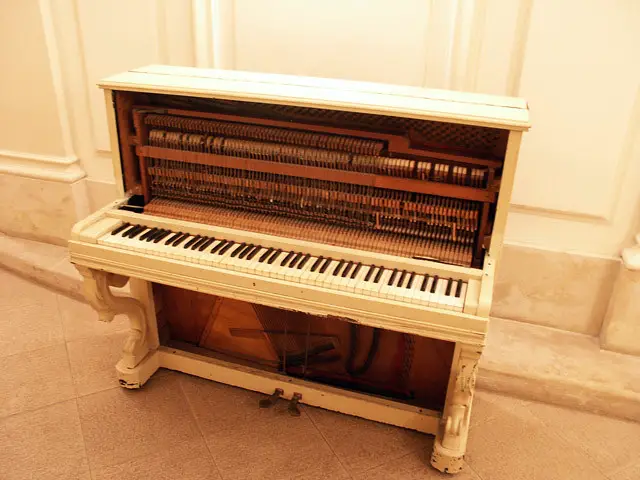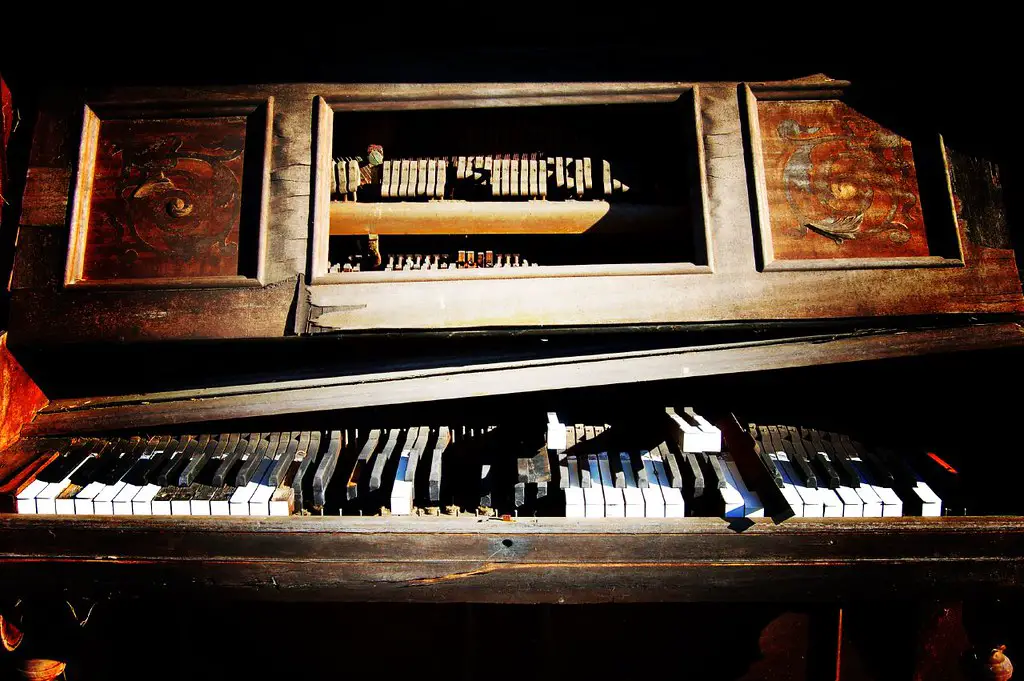Have you ever found yourself with an old piano that’s just taking up space in your home? No matter how much you may love music or the piano in particular, sometimes it just makes more sense to get rid of it.
A piano is a musical instrument played by pressing keys on a keyboard. It is played using a keyboard and produces sound by striking metal strings with felt hammers. A 40.1% increase in the volume of acoustic pianos sold in the United States in 2021, according to the American Acoustic Piano Association, tells us about the increasing use and need for the disposal of pianos.
But when it comes to disposing of a large item like a piano, it’s not as simple as throwing it out with the trash. Fortunately, disposing of a piano is a relatively simple process if you know what you’re doing. In this article, we’ll take a look at how to safely and responsibly dispose of a piano, from donating it to a local charity to recycling it for parts.
How To Dispose Of A Piano
Disposing of a piano can be a daunting task. Whether it’s an old upright or grand piano that’s been in the family for generations, or a newer digital or electric model, the process of disposing of a piano is often labor-intensive and costly. Fortunately, there are a few options available to help make the process easier and more cost-effective.

1. Selling it
Selling a piano is a great way to make a little money, especially if you have an older model that still works. Whether you decide to do it online or in person.
The first option is to check your local area for someone who is willing to buy an old piano. Ask around at music stores, churches, and music schools, as they may be able to connect you with someone who is looking for an older piano. You could also search online for local classifieds or community message boards to see if anyone is looking for a used piano.
Another option is to sell your old piano online. You can list it on an online selling forum such as Piano World Forum, or you could try listing it on an auction site like eBay or Craigslist. If you’re not sure where to start, doing a quick search on Google or Bing should bring up a few websites where you can list your piano.
2. Donating it
Donating your piano to a worthy cause or organization can be an excellent way to dispose of it and help someone else in need.
One of the first people you should consider when thinking about donating your piano is your family and friends. It could be the perfect gift for someone who has always wanted to learn the instrument. It could be a great addition to a family room or game room.
You can also look into donating your piano to retirement homes, recreation centers, service clubs, afterschool programs, nonprofit organizations, schools, and social groups. They can often use a piano to help their residents and students in a variety of ways.
Finally, you can even look into donating your piano to the piano world forum. This is an online community of piano players and enthusiasts who are always looking for ways to help each other out. By donating your piano, you can do your part to help the world of music.
3: Trade Your Piano In For A New One
Trading in your old piano for a new one is one of the most cost-effective ways to get rid of your piano. Many pawn shops, music stores, and even some online retailers offer generous trade-in deals on used pianos. The amount of money you can receive for your trade-in depends on the condition of your piano and the type of piano you are trading in.
Not only can trading in your piano help you save money, but it can also help you upgrade to a better piano. If your old piano is in good condition, you may be able to trade it in for a higher-quality piano, with better sound and more features. This can give you the opportunity to try out different makes and models before deciding on the perfect piano for you.
When trading in your old piano, it is important to do your research. Make sure you know the current market value of your piano and inspect it for any signs of damage. Most piano dealers will offer free appraisals to help you determine an accurate market value for your piano.
You can check pianomart for the value of your piano and can also exchange it here with a new one.
4: Call Your Local Piano Technician
Piano technicians are experts when it comes to repairing and regulating pianos. They can assess the condition of the piano and let you know if it’s worth keeping or can be disposed of. If the piano can be salvaged, the technician may be able to make the necessary repairs and adjustments to get it into playable condition. Once the piano is in good condition, you can then decide if you want to give it to someone, donate it, or sell it for a better price.
The advantage of calling a piano technician to dispose of your piano is that they can make sure it’s in good condition before it’s donated or sold. This can help ensure that the instrument is in the best possible condition for the next owner. In some cases, the technician can even help you find a buyer for the piano.
5: Using a junk removal company
Junk removal companies specialize in disposing of large, bulky items, like pianos, treadmills, bed frames and more, and they use garbage truck-like vehicles to haul them away.
The process of disposing of a piano with a junk removal company is simple. All you have to do is call the company and let them know what type of piano you have and where it’s located. The company will then send out a team of professionals to pick up the piano and haul it away.
Once the piano has been picked up, the junk removal company will transport it to a junkyard or other suitable facility for disposal. The company will also take care of all the paperwork associated with the disposal, so you don’t have to worry about any of the legalities.
The great thing about hiring a junk removal service to dispose of your piano is that it’s a cost-effective and efficient solution. The company will be able to handle the entire disposal process for you, which saves you time and energy. Additionally, the company will often be able to recycle certain parts of your piano, which can help keep it out of landfills.
You can see these companies online also.
6: Dump it
When it comes to disposing of a piano, the last option many people turn to is the dump. It is one of the quickest and most convenient means of disposing of a piano, but it is by no means the best or most responsible way to do it.
Before you consider taking your piano to the dump, you should exhaust all other options. If your piano is still in good condition, you should try to donate it to a music school, a local charity, or a thrift store. If it is beyond repair, you may be able to find a company that specializes in piano disposal and will take it off your hands for a fee.
If all other options fail, you may feel that you have no other choice but to take your piano to the dump. However, if this is the case, you should be aware that doing so may not be your best option. Not only is it a less responsible way to dispose of your piano, but it may also cost you money.
Many landfills require that you pay a fee in order to dump your piano. Fees can range anywhere from a few dollars to hundreds of dollars depending on the size of the piano and the landfill’s policies. In some cases, you may even need to obtain a permit in order to dump your piano.
How Much Does It Cost To Dispose Of A Broken Piano?

The broken piano disposal cost will vary depending on how the piano is disposed of and where it’s being sent. Generally speaking, you’re looking at a cost of approximately $400-$500 for disposing of a broken piano. This cost can include fees for pickup and disposal, as well as any extra fees associated with special circumstances.
Before you decide to hire a company to dispose of your broken piano, you should consider the cost of hiring a professional to repair the piano. If the damage is minor and the cost of repair is less than the cost of disposal, then it may be more cost-effective to repair the piano rather than dispose of it.
Additionally, if you can transport the piano yourself, you may be able to save some money on the disposal. In some areas, you may be able to find a local junk removal service that will pick up the piano for free or at a discounted rate.
Finally, you may want to consider donating your broken piano to someone in need. This can be an excellent way to get rid of a broken piano without having to pay for its disposal. Charities and schools often accept donated pianos and will come to pick them up for free.
The Hard Fact About Pianos
The piano is an instrument that has been around for centuries, but it still has the power to evoke emotions and create beautiful music. The digital piano market size for the year 2023 is about 1295.98 Million which tells us about the use and increasing popularity of piano. It is an instrument that requires skill and dedication to master, and its history is filled with many tales of hard work, dedication, and skill. But what are the hard facts about pianos? Let’s take a look.
1. Number of Keys: The traditional piano has 88 black and white keys, with 52 white keys and 36 black keys. This setup allows for a wider range of notes and tones, making it perfect for classical music and other genres.
2. Materials: Most pianos are made from wood, metal, and plastic. The wood is typically hardwood, such as maple or beech, and the metal is typically steel. Plastic is used for the keys and other components.
3. Strings: Inside the piano, there are over 230 strings that stretch across the length of the keyboard, with the heaviest strings on the lower end and the lightest strings on the higher end. Steel wire makes up the strings of pianos, with some modern pianos utilizing a combination of steel and synthetic materials.
4. Tuning: Pianos need to be tuned periodically in order to keep them sounding their best. This process involves adjusting the tension of the strings and making sure that each note is in tune with the other notes. It is a complicated process that requires a skilled technician.
5. Pedals: Pianos have three pedals. The rightmost pedal is the loud pedal, which increases the sound of the piano. The middle pedal is the soft pedal, which decreases the volume. Finally, the leftmost pedal is the sustain pedal, which holds down all the notes that you have played until you release it.
6. Life: With proper care and maintenance, a good piano can last for 50 years or more. Regular tuning and servicing can help keep your instrument sounding its best for decades, so it’s important to have your piano serviced by a professional technician at least once a year.
7. Types: There are two types of pianos. Acoustic pianos are the traditional type, with strings and hammers that create sound when struck. Digital pianos are electronic and often more affordable.
8. Cost: A good quality upright piano can cost anywhere from several thousand dollars to tens of thousands of dollars. Acoustic grand pianos can cost even more. But, just like buying any other instrument, you get what you pay for. Investing in a good-quality piano will help you produce beautiful music for years to come.
These are just a few of the facts you need to know about pianos. Knowing the facts can help you make a more informed decision when you’re looking to purchase a piano. Whether you’re a beginner or an experienced player, having the right instrument is essential to making beautiful music.
FAQs
-
Are old pianos worth anything?
Yes, old pianos can be worth something depending on the condition and brand. Generally, antique pianos can be valued at hundreds to thousands of dollars.
The value of an old piano will depend on its condition, brand, and age. If the piano is in good condition and is a well-known brand, it may be worth more.
On the other hand, if the piano is not in great condition and is an unknown brand, it may be worth less. Ultimately, the piano’s worth will depend on the individual piano.
-
Can you burn an old piano?
Yes, you can burn an old piano. It is important to make sure you do it safely, however. Make sure to remove any strings and other components that could be flammable, and check the piano is placed in a safe place away from buildings or other objects.
It is also important to have the proper safety equipment, such as fire extinguishers, on hand before burning the piano.
-
Can you donate a piano?
Yes, you can donate a piano. Many organizations and charities accept piano donations, such as musical instrument charities, churches, schools, and community centers. You can also check with local thrift stores, Goodwill, and Salvation Army to see if they accept piano donations.
Before donating, it’s a good idea to call ahead to make sure the organization or charity can accept the piano. You may need to arrange for the delivery or pick-up of the piano.
-
Can you sell your old piano?
Yes, you can sell your old piano. Depending on the condition, age, and make of the piano, you may be able to sell it through a private sale, consignment shop, or online.
If you are looking to get the most money for your piano, you may want to research different options to find the best option for you. The online available options are given above you can see them.
Conclusion
Disposing of a piano can be a difficult and expensive task. It is important to consider the various options available before attempting to dispose of a piano.
Depending on the condition of the piano, it may be possible to donate or sell the instrument. Other options include hiring a professional piano mover, recycling the piano, or disposing of the instrument through a landfill or trash collection service.
No matter which option is chosen, it is important to take the proper precautions to ensure the safe disposal of the instrument.

Gemma Alexander has an M.S. in urban horticulture and a backyard filled with native plants. After working in a genetics laboratory and at a landfill, she now writes about the environment and recycling topics.


